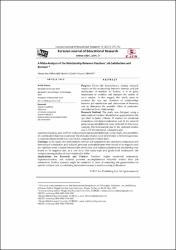| dc.contributor.author | Yorulmaz, Yılmaz İlker | |
| dc.contributor.author | Çolak, İbrahim | |
| dc.contributor.author | Altınkurt, Yahya | |
| dc.date.accessioned | 2020-11-20T14:54:17Z | |
| dc.date.available | 2020-11-20T14:54:17Z | |
| dc.date.issued | 2017 | |
| dc.identifier.issn | 1302-597X | |
| dc.identifier.issn | 2528-8911 | |
| dc.identifier.uri | https://doi.org/10.14689/ejer.2017.71.10 | |
| dc.identifier.uri | https://app.trdizin.gov.tr//makale/TXpBNE1USXhNUT09 | |
| dc.identifier.uri | https://hdl.handle.net/20.500.12809/2121 | |
| dc.description | WOS: 000417386300010 | en_US |
| dc.description.abstract | Purpose: Given the inconsistency among research studies on the relationship between burnout and job satisfaction of teachers in Turkey, it is of great importance to combine and interpret the results of such studies. In this regard, this study aims to examine the size and direction of relationships between job satisfaction and dimensions of burnout, and to determine the possible effect of moderator variables on these relationships. Research Method: The study was designed using a meta-analysis method. Identified as appropriate to the specified inclusion criteria, 15 studies for emotional exhaustion and depersonalization and 14 for reduced personal accomplishment were included in this meta-analysis. The total sample size of the included studies was 3,778 for emotional exhaustion and depersonalization, and 3,455 for reduced personal accomplishment. In the study, the possibility of a publication bias was examined. The included studies were determined to be heterogeneous. A random-effects model was used in the computation of effect sizes. Findings: In the study, the relationships between job satisfaction and emotional exhaustion and between job satisfaction and reduced personal accomplishment were found to be negative and at a medium level, whereas between job satisfaction and depersonalization the relationship was found to be negative and at a low level. For study-type and grade-level moderators, the variance among studies did not statistically differ. Implications for Research and Practice: Teachers' higher emotional exhaustion, depersonalization, and reduced personal accomplishment relatively reduce their job satisfaction. Further research might be beneficial in favor of extending the generalization in specific cultures and in combining inconsistent research results existing in literature. (C) 2017 Ani Publishing Ltd. All rights reserved. | en_US |
| dc.item-language.iso | eng | en_US |
| dc.publisher | Ani Yayincilik | en_US |
| dc.item-rights | info:eu-repo/semantics/openAccess | en_US |
| dc.subject | Research Synthesis | en_US |
| dc.subject | Effect Size | en_US |
| dc.subject | Emotional Exhaustion | en_US |
| dc.subject | Depersonalization | en_US |
| dc.subject | Reduced Personal Accomplishment | en_US |
| dc.subject | Job Satisfaction | en_US |
| dc.title | A Meta-Analysis of the Relationship Between Teachers' Job Satisfaction and Burnout | en_US |
| dc.item-type | article | en_US |
| dc.contributor.department | MÜ,Eğitim Fakültesi, Eğitim Bilimleri Bölümü | en_US |
| dc.contributor.institutionauthor | Yorulmaz, Yılmaz İlker | |
| dc.contributor.institutionauthor | Çolak, İbrahim | |
| dc.contributor.institutionauthor | Altınkurt, Yahya | |
| dc.identifier.doi | 10.14689/ejer.2017.71.10 | |
| dc.identifier.issue | 71 | en_US |
| dc.identifier.startpage | 175 | en_US |
| dc.identifier.endpage | 190 | en_US |
| dc.relation.journal | Eurasian Journal of Educational Research | en_US |
| dc.relation.publicationcategory | Makale - Uluslararası Hakemli Dergi - Kurum Öğretim Elemanı | en_US |


















